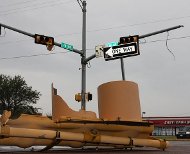1/19/2011
Texas: Red Light Cameras Boost League City AccidentsA look at preliminary accident data shows no improvement at red light camera intersections in League City, Texas.

Red light cameras in League City, Texas have failed to reduce accidents according to preliminary data provided by the Texas Department of Transportation (TxDOT). Since October 2009, the Australian firm Redflex Traffic Systems has issued citations at three intersections along FM 518. Local activist Byron Schirmbeck analyzed TxDOT reports and found the number of accidents at these locations increased after camera installation. In November, Schirmbeck led the November successful referendum effort twenty miles away in Baytown where voters rejected the use of automated ticketing machines.
Overall, the total number of accidents increased 20 percent at League City's monitored intersections. Rear-end collisions jumped the most with an increase of 68 percent. Only injury crashes saw a decrease from a rate of 19 before to 16 afterwards. The TxDOT reports offer a limited look at the effect of cameras, with 8 to 9 months of data for the "after" period and 18 months for the "before" reports. The analysis reflects accident rates on an annualized basis.
The data also showed that two of the three intersections chosen for camera use had no problem with red-light related accidents. At FM 2094 there were no accidents of the type red light cameras are meant to address in the 18 months prior to installation. Highway 3 had only one such accident. The intersection of Interstate 45 and FM 518 did have a red-light related accident problem before cameras were installed, but it also had yellow signal warnings that were so short they violated the law. The interval between the green and red lights was set to just four seconds -- 0.7 seconds shorter than the minimum required under TxDOT regulations at an intersection with a posted 50 MPH speed limit. As a result, the city was forced to refund or cancel $130,000 worth of tickets.
Schirmbeck hopes to increase safety by giving voters in League City the same chance that Baytown had to ban the devices.
"Our petition cost the camera company millions in lost revenue and over $200,000 in setting up their fake front group to try to block and overturn our election," Schirmbeck said in a statement. "We still have a long way to go... We will also continue to work together with other citizens that want to reject the cameras in their towns. Port Lavaca, Texas has already turned in their petition and Humble is working on theirs. We also urge the Texas legislature to renew their efforts to ban the cameras statewide. It is shameful that private citizens have to do what the legislature failed to do last session."
A copy of the analysis is available in a 75k PDF file at the source link below.


